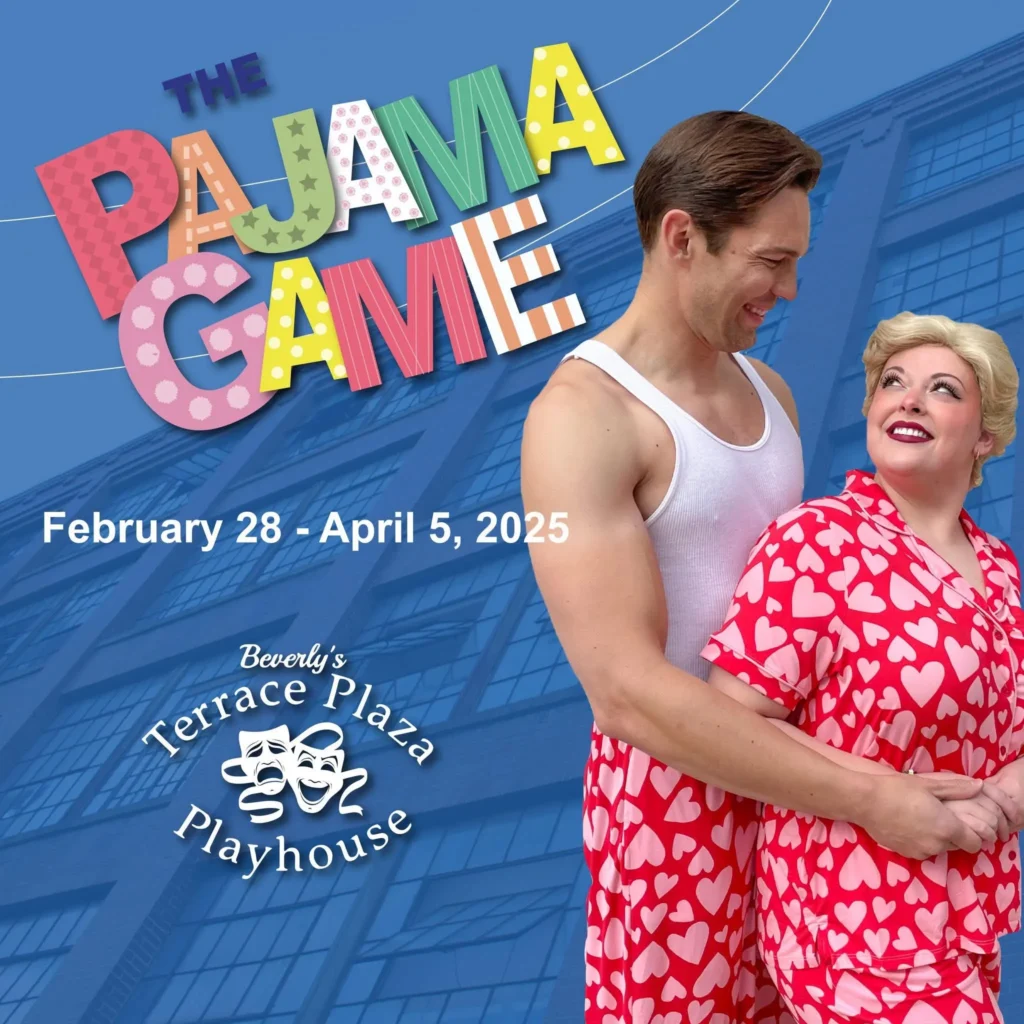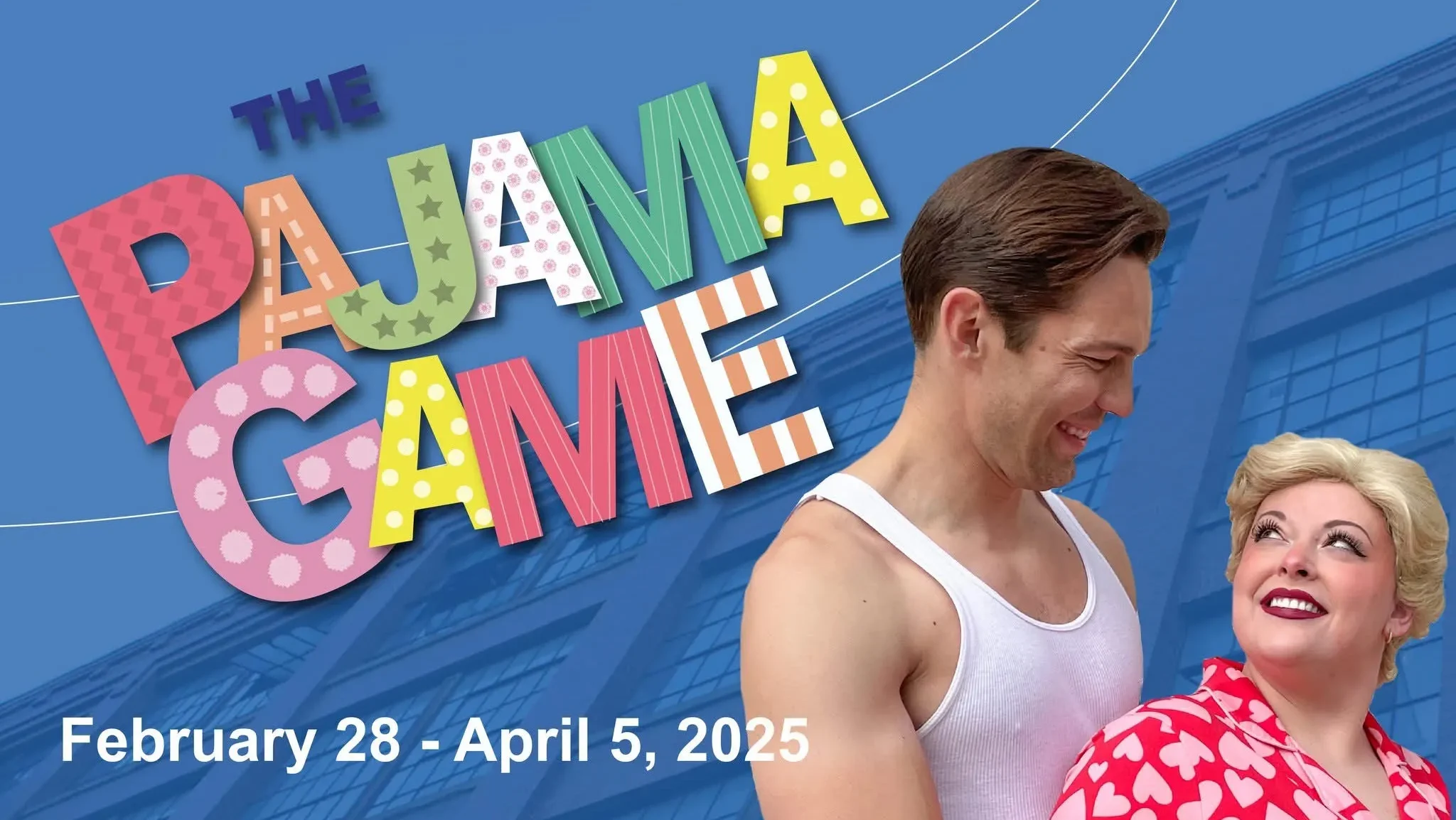WASHINGTON TERRACE — Beverly’s Terrace Plaza Playhouse delivers a fun and flirty production of The Pajama Game, a classic musical set in the 1950s. While some elements are dated, the contemporary themes of worker’s rights and fair compensation remain relevant. Under the direction of Melissa Trenery, this cast brings to life fun and delightful musical numbers by Richard Adler and Jerry Ross. The book for The Pajama Game is by George Abbott and Richard Bissell.
Based on Richard Bissell’s novel 7½ Cents, the musical outlines the events of a dispute over wages at the Sleep-Tite Pajama Factory. Workers are rallying for what may seem a minimal 7½ cent raise. Still, it was significant for the time and equivalent to about $0.85 today. The significant of a raise (of any value) raises questions of morale and meaning, highlighted in the musical number “Seven-And-A-Half Cents.” The workers sing about what the raise will mean personally, not just for one hour of work, but what they can afford after 5, 10, or even 20 years!
The promise of what a raise can mean for valuing work in the present and dreaming for the future matters, and the ensemble of The Pajama Game captured that feeling. The ensemble rallies together during this number, though it is strange to reflect how much monetary values have changed. Trenery references our modern concerns with inflationary pressures in the director’s note, and the conflict between employees and employers is an ongoing struggle.

This conflict is personalized and complicated by romantic interest between Sid Sorokin, the factory’s new superintendent, and Katherine “Babe” Williams, the leader of the grievance committee. Clarissa Wykstra delivers a standout performance as Babe, exuding confidence and humor while showcasing powerful vocals. Wykstra is an excellent leading lady, feeling effortlessly in love and equally determined to lead the worker’s cause. Nick Balaich, as Sid, complements Wykstra very well. Balaich gives a nice performance of the charming superintendent who quickly falls for Babe. Their duets, especially “There Once Was a Man,” are all highlights, filled with playful interactions and two talented vocalists. Balaich’s solo, “Hey There,” features a clever interaction with a radio recording of his prerecorded vocal. It was a highlight of the performance, and Balaich’s voice had an excellent tone and phrasing perfect for a 1950s era love song.
The side characters add a lot of color and personality to the performance. Karlie Ady plays the president’s secretary, Gladys, as funny and exaggerated without feeling like a caricature. Amelia Tilley, playing Mabel, is a comedic gem, delivering lines with quick wit, and Tilley stands out in the scenes she appears in. Tilley and Josh Twitchel (Hines) are especially delightful in their rendition of “I’ll Never Be Jealous Again.” These characters and the rest of the ensemble contribute to a sense of community and personality. The performance and themes are stronger because of the camaraderie of the workers, reinforcing the idea that they are fighting for something greater than themselves.
Despite commonalities shared with modern audiences, some aspects of the book and story feel dated. The character of the skirt-chasing president, “Prez,” and the tense dynamic between Gladys and her boyfriend, Hines, feels jarring to modern sensibilities. While the performers do their best to play these moments for comedy, dated stereotypes let them down, and sometimes doesn’t land well.
The production is strongest during the musical numbers, with Megan Call‘s choreography greatly enhancing the energy. The rhythmic toe-tapping during “Racing with the Clock” shows the repetition of factory work. Later, the slowed-down reprise during the workers’ slowdown uses the same steps at a slower tempo to great comedic effect. “Hernando’s Hideaway” is another fun example of clever and comedic choreography, skillfully using staging, lighting, and movement creating a sense of mystery and excitement. “I’m Not At All In Love” features Babe and the factory girls and had my favorite moment of staging in the show as Babe is startled by Sid as she is energetically protesting her love.
However, the production’s weakness is the pacing in the second act, where scenes begin to drag between musical numbers. Director Trenery could tighten these moments to maintain the momentum established in the more lively first act. In particular, the dialogue following “Hernando’s Hideaway” felt noticeably slow. An issue with dialogue was actors not actually interrupting a line, but waiting for the interruption.
Jamila Lowe and Jim Tatton’s costume design captures the essence of 1950s fashion with vibrant colors and layered ensembles that feel period-appropriate. While individual pieces would look modern on their own, the overall effect together makes it consistent to the era. Women wear a mix of colorful capris, cardigans, and dresses. The men wear shirts and ties, but only the boss wears a full dark suit.
The lighting by Danielle Loveland helped enhance the budding romance as lights dimmed and felt moody for the romantic solos. The full stage bright lighting for the outdoor picnic was a nice contrast from the indoor office scenes. There were occasional timing lapses during the production, with missed light cues or actors falling out of the light and appearing in shadow. These technical hiccups, while minor, were noticeable.
The theater shows the power of working together, and the production of The Pajama Game at Beverly’s Terrace Plaza Playhouse is a great example. The ensemble delivers their enthusiasm for the performance, making the onstage camaraderie of their characters resonate. There’s some maturity in the romance elements, and the story will appeal to anyone employed, almost like a more mature Newsies. The love story between Sid and Babe is sweet and relatable. At the same time, the workers’ fight for fair treatment is very relevant today. The combination of labor issues, humor, and a classic musical romance in live performance is an entertaining blend.
[box] The Pajama Game plays at Beverly’s Terrace Plaza Playhouse (99 East 4700 S Washington Terrace, Utah 84405) Fridays, Saturdays, and Mondays at 7:30pm through April 5th. Tickets are $18-25. For more information see https://www.terraceplazaplayhouse.com/ [/box]
